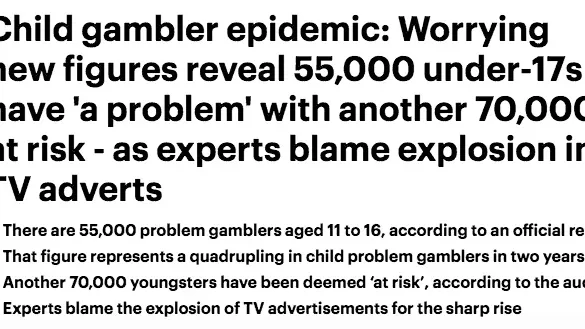Gambling is big business in the UK, but at what cost?
Words by Tom Fleming
With the recent news that Denise Coates, CEO of Bet365, has been paid over £1 billion over the last four years, we’ve taken a closer look at some of the alarming – and eye-watering – figures that emphasise the true nature of the UK’s gambling problem.
Gambling harm in the UK
Gambling masquerades as a harmless ‘bit of fun’, portrayed in adverts as a legitimate leisure activity. However, if you look past the celebrity endorsements and glossy PR, a very different story emerges:
- One in four people who gamble suffer, or are starting to suffer, significant harm
- Heavy gambling is associated with over 35% increased mortality
Addiction
At present, much of conversation around gambling addiction places the overwhelming majority of responsibility on the individual, absolving the industry of any wrongdoing.
Even the widely used term ‘problem gambler’ suggests that addiction is the result of ‘faulty’ individuals that are somehow to blame for becoming addicted to products designed specifically to cause addiction.
However, gambling disorder – i.e., those classified as ‘problem gamblers’ – was classified as equivalent to drug and alcohol addictions in 2013, meaning it is accepted as a mental health condition that requires specialist clinical assessment and treatment.
The truth is that all gambling is associated with a risk of harm and anyone gambling can be harmed.
- There are between 340,000 and 1.4 million adults in the UK classified as ‘problem gamblers’
- There are also over 55,000 11 – 16-year-olds are classified as ‘problem gamblers’
- There are between 250 and 650 gambling related suicides every year in the UK
It is safe to assume that addiction is central to the industry’s business model, and is therefore actively cultivated and sustained:
- Between 60% and 86% of the industry’s overall profits coming from just 5% of ‘players’
- Some of the most dangerous forms of gambling have 50% addiction/at risk rates in contrast to heroin (20/30% addiction rate) and tobacco (30% addiction rate)
- 50% of all gambling addiction in 2016 in the UK was associated with online casino gambling/ slots
Money
As addiction takes hold, the prospect of winning money plays second fiddle to a pathological need to continue gambling.
Money, however, remains the number one incentive for the industry. The gambling industry’s profits are measured in GGY (gross gambling yield), which is the amount retained by the industry once winnings and operating costs have been paid out:
- For the period between April 2019–March 2020, the industry’s GGY was £14.2 billion
- That’s enough for every single person in the UK (including those not old enough to gamble) to have lost at least £202 in 12 months
Advertising
The industry argues that there is not enough evidence that advertising has an impact on addiction rates and gambling-related harm, but of course they have this data and know exactly how to market their brands. Adverts and marketing that are purposefully created to increase consumption of products that are designed to maintain a habit inevitably result in over-consumption, or, in simple terms, addiction.
Before the 2005 Gambling Act came into law, the only gambling-related adverts shown on TV were either for the football pools, bingo or the National Lottery.
In the five years that followed the 2005 Gambling Act coming into law in 2007, the amount of gambling adverts shown on TV rose by a massive 600%
- By 2016, 42% of adults had gambled in the past year
- The GGY for the entire gambling industry stood at £12.6 billion
By definition then, these adverts ‘worked’, meaning more people gambled more money, and, inevitably, more people suffered more gambling-related harm.
But gambling contributes a lot of money to the economy!
This is perhaps the most frequently heard, pro-industry argument.
However, there is more than enough research to suggest that the true cost of gambling to the economy far outweighs any public benefit.
A recent report by the Social Market Foundation concluded that:
“If net gambling spend declined by 10% (about £1 billion) and individuals spent money on retail instead – for example, as a result of regulatory reforms which curb problem gambling – we estimate that:
- GVA (gross added value) would be £311 million higher.
- The number of jobs in the economy would increase by 24,000.
- The Exchequer would receive an additional £171 million in tax revenues.
Similarly, a study from Sweden found that:
- The societal cost of gambling in Sweden in 2018 was 1.42 billion euros – .3% of GDP
- Direct costs (addiction treatment, debt counselling, prison) only accounted for 13% of the total expenditure,
- Over half of the cost (59%) was attributed to indirect factors (absence from work, reduced workplace activity, unemployment and suicide)
Research and treatment
Another of the major problems with the way that the industry is currently set up and regulated is that the majority of research into and treatment of gambling addiction is paid for by the industry via voluntary contribution.
Firstly, research on a harmful product should be independent from the industry that creates the product. Would we trust research from the tobacco industry on the dangers of smoking?
Secondly, despite the huge profits the industry makes every year, they contribute pitiful amounts to research and treatment, while paying a collective £30 million a year to sponsor Premier League teams. A recent Guardian article found that:
- Crystal Palace’s sponsor, W88, which based in the Philippines, contributed just £250
- TGP Europe, the company that facilitates shirt sponsorship for SBOTOP, Sportsbet.io and Fun88 (who sponsor Leeds United, Southampton and Newcastle respectively), contributed just £5,000
- Similarly, Vivaro, which helps ManBetX and LoveBet sponsor Wolves and Burnley, gave only £10,000
The figures outlined above highlight the true – and horrifying – scale of the problem. They also underline the need for a public-health focused approach to gambling, one that prioritises the health of the public over private profit.
To support our cause, please sign and share our petition and keep an eye on our events page to find out how you can get involved in the next Big Step.
Thank you for your support.


